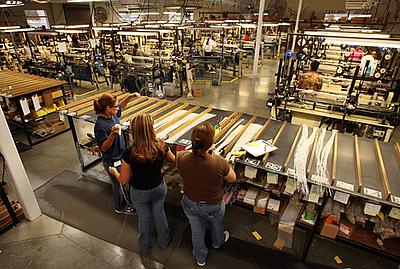Anyone who even casually browses the news media on a regular basis has seen considerable coverage of the many challenges facing the U.S. economy as we all try to move on from the problems associated with the COVID pandemic.
So, it’s likely you know much more about things like supply chain management, the challenges of recruiting and training workers, raw material cost spikes and consumer price increases than you ever imagined you would. But you’ve likely come to know much more about these issues through daily experiences than by reading articles and watching news broadcasts.
Everywhere we look, the ramifications of the pandemic are apparent; from product shortages that are clearly visible based on sections of empty shelves in stores, extreme lead times for things we must order, the dearth of staff anywhere we shop and the soaring prices that continue to confound us.
When it comes to physical products, the root of all of them is manufacturing. Turning raw materials into products through manual labor and/or machinery has become an extremely technology driven exercise which is highly regulated in the U.S., especially in California. The complexity of manufacturing, from procuring equipment, labor and materials to make reliable, safe products then getting them to the final consumer is immense for all companies in the sector, large and small.
One statewide organization, California Manufacturing Technology Consulting (CMTC), has been a strong force for good for a large number of the state’s 37,000 manufacturers that have been navigating the significant challenges in the sector for many years.
CMTC is a private nonprofit corporation established in 1992 to provide technical assistance and workforce development to small and medium-sized manufacturers in Southern California. It operates through a cooperative agreement with the Hollings Manufacturing Extension Partnership of the National Institute of Standards and Technology under the Department of Commerce. The organization’s mission is to serve as a trusted advisor providing solutions that increase the productivity and competitiveness of California’s manufacturers.
Serving an average of 1400 companies per year, CMTC provides assistance on a wide range of key issues facing manufacturers, including but not limited to technology acceleration, continuous improvement, sustainability, workforce and supply chain management. As a public-private partnership, CMTC often utilizes a collaborative approach to helping address the challenges facing manufacturers which means establishing partnerships with organizations like economic development organizations, community colleges, professional service providers and others based on the needs of a given company or group of them in a particular region.
“We look for opportunities to help manufacturers address challenges in areas such as operations, workforce and sales to lower costs, increase productivity, upskill their workforce and find new customers, says CMTC’s President & CEO, Jim Watson. We bring value by assisting with strategy and continuous improvement leading to profitable growth.”
Watson, who has been with CMTC for more than 21 years, notes that California generates the greatest manufacturing output of all states in the U.S. by far, something that may surprise many people. “The manufacturing sector contributes very substantially to California’s GDP, so it’s important that we keep manufacturing as strong as we possibly can. It is an industry that provides high-paying jobs and is a great multiplier of non-manufacturing jobs and economic impact as well.”
The Massive Impacts of Manufacturing in California
In the latest available data, and most basic measures cited by the U.S. Bureau of Labor Statistics, the manufacturing sector in California accounts for more than $300 billion in total output and employs roughly 1.3 million people who earn an overall average wage of $109,000 per year.
While these are impressive numbers, Watson points out that employment in manufacturing since 2000 is down 32% in California which is the equivalent of approximately 600,000 jobs, but it’s also down 29% nationwide. “When you’re evaluating manufacturing in our state and see output increasing while at the same time we’ve lost about 600,000 jobs since 2000, it shows that improvements in productivity continues to drive output” says Watson. “California manufacturers are among the most productive in the country, for years they have done more with less”.
“Obviously, we strive to continue to grow manufacturing. As manufacturers grow, they will add jobs which have traditionally been quality middle class jobs,” adds Watson, “I think we’ll see the buildup in the sector again. However, manufacturers will need to find skilled workers and expedite technology adoption for the build up to occur”.
There are almost 800 manufacturers in the Greater Palm Springs region plus the pass area communities including Banning, Beaumont and Hemet.
Watson notes that most of our region’s manufacturers have less than 20 employees, and roughly 75% of those have annual revenue less than $1 million. “So, it’s a community of smaller manufacturers overall and it’s more challenging to have meaningful contact with the smaller companies who could benefit greatly from our services and those of our partners,” says Watson. “To serve manufacturers in that region, we really have to reach out to let them know we are here for them. That includes direct marketing, getting referrals from professionals like CPAs and attorneys, and working with a wide range of partners to get the word out, assess their challenges and then provide assistance to address their specific needs.”
Getting Through the Height of the Pandemic to Today’s Realities
After the initial jolt of the stay-at-home order and the related uncertainty of COVID in March 2020, manufacturing was declared one of the essential industries and companies were able to reopen at varying levels, but they had to adapt to a long list of challenges immediately.
“It was triage in the beginning, then on to stabilization and next step is recovery which we’re still looking to achieve,” says Watson. “Like it was for so many sectors, there was a lot of uncertainty especially in handling workplace issues. There were many open questions that came up, because of the innate complexity of running manufacturing operations. So, they figured out how to keep the doors open, over time got a handle on their operations and for many the next step has been looking at growth and expansion opportunities.”
Much of CMTC’s work for clients is now focused on developing growth-related skills and capabilities, navigating supply chain disruption, workforce recruitment and addressing the higher cost of materials. “People want to know how they can improve their website, sales capabilities, and develop additional channels to attract new customers,” adds Watson. “. But they are also concerned about costs. Inflation has impacted manufacturing and we don’t know how long that will last. The cost increases have arisen primarily from workforce scarcity and supply chain disruption.”
CMTC recently revealed the results of a survey of California manufacturers conducted by an independent organization. The number one challenge, which was cited by 65% of respondents, is finding skilled workers. The second most pressing issue following closely behind is supply chain disruption and the third most pressing is inflation of materials costs.
“Being able to find new suppliers as they pivoted to new products or as existing suppliers were unable to deliver has been a big deal,” notes Watson. “Can they shorten their supply chain? Can they be price competitive using new suppliers? Can they lower costs and increase productivity through automation and technology? These are the questions of the day, and the issues CMTC is helping to solve every day.”
From last June until now, as a result of CARES Act funding, CMTC was able to engage with more than 6,500 manufacturers whether through supplier scouting, online webinars, conducting assessments or delivering plans of action. “Everyone needed help in the past year,” says Watson. Providing that much support without being able to have consultants on-site with clients required CMTC to adapt too. “One way we were able to help more people than ever was through webinars,” says Watson. “In fact, because of the pandemic, everything we did last year was through remote delivery. I couldn’t be more proud of our team and our partners. CMTC’s California’s Manufacturing Network of third party service providers and partners throughout the state all pulled together to help a significant number of manufacturers.”
CMTC, which is headquartered in Torrance, has 75 employees – most of whom live and work in the community they serve. To expand capabilities and expertise on behalf of clients, CMTC utilizes roughly 70 third party service providers to support their staff along with numerous strategic partners throughout the state. “California’s Manufacturing Network provides the horsepower and teamwork to address the needs of the more than 37,000 manufacturers statewide.”
As a result, CMTC is positioned as the go-to organization for manufacturers in California. “Manufacturers know that we understand their business, whether it’s for employee recruitment, IT, growth, the plant floor, processes and more,” adds Watson.
The results of everything CMTC does is measured by third party surveys. One data point, for example, is that CMTC helped clients achieve a total sales impact of $544 million last year. “It’s amazing to see how companies leverage the help they are given to achieve incredible results in sales, cost savings, filling jobs, etc.,” adds Watson.
CMTC strives to make its services affordable, especially very small manufacturers. To help these companies get started, they have a co-investment service called the California Manufacturers Accelerator Plus program. “The program provides 24 hours of technical assistance, and it’s usually focused on growth or HR services,” says Watson. “We invest our time as do they to find out what they can do to improve their performance. It costs them time, which is very valuable to them, so they are making a commitment along with us. The key is for the companies to ask for help, participate in identifying the challenges and solutions, then run with it.”
One Client’s Story
One of numerous success stories of CMTC’s work with an individual company in the Inland Empire region is the long-term relationship they have developed with Able Industrial Products, Inc., headquartered in Ontario. The company has 63 employees in Ontario and 44 in Baja, Mexico where they have a duplicate facility.
Second-generation president of the company, Gilbert Martinez, briefly sums up his impressive company’s manufacturing operations by stating, “We make widgets. Everything we make is behind what you see as the main product.”
“The biggest obstacle to success for a small company like ours is access to information and resources,” says Martinez. “CMTC is on top of virtually everything involved with manufacturing in California, so we rely on them to know about things that we can’t possibly research on our own while trying to run our company.”
One of the most important things CMTC helped Able with is securing a sizable volume of research and development tax credits. “We had no idea what it was, and the paperwork is quite a handful to say the least, but CMTC was all over it. They helped us to first identify it as an opportunity for us and then to get it accomplished,” says Martinez. “They also help us with employee recruitment and issues like securing raw materials, which has been an especially critical challenge during the pandemic. There’s no playbook for these things, but CMTC is an incredible resource that has the knowledge and capabilities for whatever we need, even when we didn’t know it was available.”
CMTC set up what is referred to as a Peer Council for the Inland Empire. “We meet once a month with the top people at several other companies and talk about a wide range of important topics and what’s working or not. It’s truly an invaluable resource to rely on, and the CMTC staff leading it are brilliant and so effective in their work with us,” says Martinez. “Sometimes they bring speakers for us too, including one time when we had Matthew Mena who is the Inland Empire Regional Business Development Specialist for the Governor’s Office of Business and Economic Development (GO-Biz) join us.”
Mena met separately with Martinez as a follow up to the Peer Council meeting. “He took the time to personally meet with me in my office and we spent a lot of quality time together,” says Martinez. “He told me about all the things California is doing for small businesses, from recycling programs, solar panel ROI, the California Capital Access Program for three-year loans by banks to increase capacity and expertise and much more.”
In recent years CMTC helped Able Industrial Products achieve the AS9100 certification, which is a quality standard in the aerospace and automotive industries, and then with the ISO 13485 medical devices certification. “Because of my ISO 13485 certification I have been able to supply medical products during the pandemic,” says Martinez. “Both of the certifications have enabled us to greatly expand our business, especially as the medical product sector grew enormously because of COVID. We would not have accomplished this without the great knowledge and work of our team at CMTC.”
As a result, “We were very blessed last year,” adds Martinez. “We switched over to producing medical shields and produced more than two million of them. We were just trying to keep afloat at first, but the medical sector helped us have one of our best years ever and the medical sector work for us keeps growing. Now we’re getting to pick and choose which products we want to produce for the medical sector. Unfortunately, there’s a backlog on new equipment so that has hampered us a bit but overall we’re in a great position and a lot of it is because of what CMTC has helped us identify as solutions and then they’ve helped follow through.”
“Any time I have a question on an issue, I call my contacts at CMTC and they deliver resources to me whether it’s a referral to multiple experts, research and ideas, and follow up,” says Martinez.
For more information about the valuable services available at CMTC, visit www.cmtc.com.




